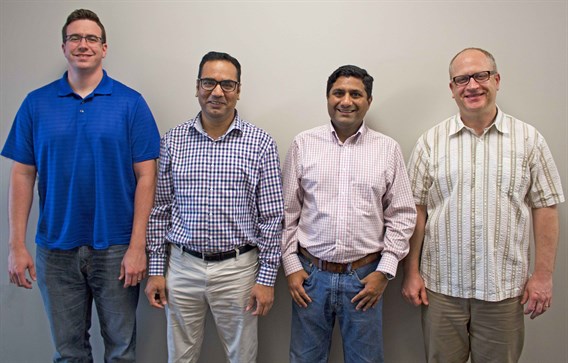 Four professors in the Department of Biomedical engineering at Texas A&M University have been awarded funds to participate in the 2017-2018 AggiE_Challenge program.
Four professors in the Department of Biomedical engineering at Texas A&M University have been awarded funds to participate in the 2017-2018 AggiE_Challenge program.
Dr. Daniel Alge, Dr. Akhilesh Gaharwar, Dr. Abhishek Jain and Dr. Roland Kaunas (left to right) will take part in the AggiE_Challenge.
Alge and his team have proposed to overcome the challenge of robust methods of manufacturing hydrogel microparticles for regenerative engineering. They will develop a compact electrospraying system that is capable of rapidly producing large volumes of tissue-mimetic microparticles with precise control over their size and properties.
Gaharwar and his team have proposed to print different tissue structures loaded with tissue-specific cells using 3-D bioprinting and connect these different tissue structures to evaluate synergistic interactions between them. Multiple engineering disciplines will optimize the printing process, and they will then be able to perform the necessary cell culture and assays demonstrating system viability.
Jain and his team have proposed to develop a 3-D printed prototype of a venous blood vessel, in which the blood may clot naturally as in cancer patients who develop a potentially fatal condition called deep vein thrombosis or DVT. This tool will advance knowledge of how blood clots in cancer and may also serve as a testing bed for medicines prior giving them to patients.
Kaunas and his team have proposed to produce engineered trachea and bone grafts using rotary jet spinning, which employs centrifugal force to generate microfibers at high rates. A previous AggiE-Challenge team developed the device for preparing scaffolds and a perfusion bioreactor for culturing cells on the scaffolds. The new team will collect fiber on spinning cylindrical spindles and integrate these scaffolds with decellularized tracheal and bone tissues.
AggiE_Challenge is a program designed to actively engage engineering undergraduate students with multidisciplinary team projects related to the engineering challenges facing our society.
Undergraduate students will actively participate in the project under the guidance of each professor participating in the program and students enrolled in the AggiE_Challenge will earn credit hours toward their degree requirements.
For more information on the program, visit the AggiE_Challenge website.